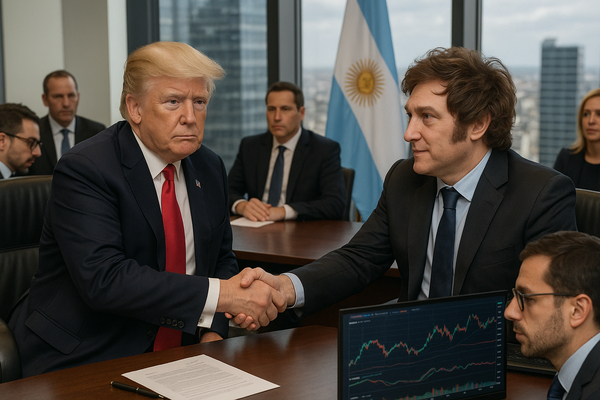
Markets Prepare for Trump‑Milei Meeting as Argentina Assets Rally and Banks, Wealth Units Make Strategic Moves
Global markets open with attention fixed on a meeting that traders expect to have outsized political and financial implications. Argentina’s international bonds jumped and local stocks climbed on Tuesday ahead of an anticipated encounter between U.S. President Donald Trump and Argentine leader Javier Milei. That move extended the previous session’s sharp gains and lifted risk appetite for instruments tied to the country. The market reaction reflects hopes that the meeting will reduce uncertainty and create clearer signals for investors who had recently reassessed Argentine assets.
The resurging interest in Argentine debt and equities provides a clear early indicator of how sentiment can recover quickly when political developments look constructive. International bond prices responded first, with yields likely moving lower as buyers returned. Local equity gains followed as traders priced in better prospects for policy clarity. For investors active in emerging markets, especially those who had trimmed exposure during episodes of heightened doubt, this sequence will be closely observed for confirmation that momentum is durable rather than a temporary relief rally.
Outside of Argentina, the financial sector commanded headlines as large institutions adjusted positions and addressed legal and regulatory matters. UBS agreed to nearly a one billion dollar payment to resolve a French tax case. That settlement underscores the continuing need for global banks to manage legacy risks while pursuing new business priorities. News of significant legal provisions can alter sentiment towards bank stocks on a regional basis and prompt investors to reassess balance sheet resilience and capital planning.
At the same time, strategic hires and organisational moves across several major banks signal a focused effort to expand fee-generating businesses. JPMorgan has been active on two fronts. Reports say the firm will engage stakeholders on the H-1B visa fee, a matter that could affect labour costs and talent availability for technology and deal teams. Separately, JPMorgan is hiring senior bankers to expand its mid-cap investment banking capabilities. Such moves point to a push to capture more deal flow in a segment where tailored advisory services can be lucrative.
Citigroup is realigning its wealth management leadership by bringing in veterans from Goldman and BNY. That direction reflects the importance institutions place on client relationships and personalised wealth offerings as competition intensifies for high net worth clients. Wealth units are a relatively stable fee source during periods of market volatility, and changes in leadership can influence product prioritisation and distribution strategies.
Regional banks are also repositioning. TD Bank named Jon Rasmussen, formerly of JPMorgan, as head of U.S. compliance. Strong compliance leadership remains a core priority for regulators and shareholders. Firms that move quickly to strengthen governance and controls tend to attract more patient capital, a factor that may shape credit spreads for certain lenders over the medium term.
Corporate strategic activity extended to Europe where Monte dei Paschi secured 86.3 percent of Mediobanca in what the report described as one of the more exotic takeover bids. Such consolidation events are watched for their potential to reshape control dynamics within national banking systems. They can also affect investor expectations for restructuring, synergies, and future capital needs.
Technology and regulation intersected in a notable comment from the Bank of England. The central bank’s governor said artificial intelligence can help regulators identify the so called ‘smoking gun.’ That observation highlights growing confidence in machine learning tools to detect misconduct and systemic risks. For market participants, the prospect of more powerful supervisory analytics means that compliance breaches may be detected earlier and enforcement actions could become more targeted. Firms will need to weigh investments in their own technology against evolving regulatory expectations.
Asset management and private wealth channels are seeing fresh activity as well. A DBS-backed family office platform reported assets of seven hundred eighty million dollars and stated plans to double that total by the end of 2026. Growth in family office and private wealth platforms points to increasing demand for bespoke solutions and long duration capital. Managers who can offer differentiated services and operational efficiency may attract flows that support valuation multiples for the sector.
Putting these developments together, the market narrative for the next trading session looks mixed but with clear directional cues. Political developments in Argentina provide an immediate catalyst that could underpin risk assets at the margin. Bank sector headlines, from legal settlements to takeover outcomes and strategic hires, will influence sentiment among financial stocks. Regulatory themes, particularly the use of AI, add a structural element that could affect investor expectations for compliance costs and operating models.
Traders and portfolio managers will likely be balancing headline-driven moves with longer term positioning decisions. Short term flows can accentuate price moves in credit and small cap equities. At the same time, institutional investors are assessing the implications of personnel changes and strategic repositioning at major banks and wealth managers. Market participants should monitor volatility in Argentine instruments for signs of confirmation, and watch for follow through in European bank shares after the UBS settlement and the Monte dei Paschi transaction update.
For subscribers who prefer audio, the newsletter indicated audio editions are available and that the Reuters app provides access. Global Investor remains a daily briefing sent on weekdays. If you received this preview from a colleague, they were encouraged to share signup details. The newsletter also noted that sponsors do not take part in editorial creation and included standard privacy and subscription links for readers who wish to update preferences.
Expect the day ahead to be defined by how participants parse the Trump‑Milei expectations in Buenos Aires and Washington, while second order effects from bank legal settlements, hires, and takeover moves unfold. Market moves may be concentrated in bank equities, emerging market debt linked to Argentina, and wealth management and family office related equities. Risk managers should be alert to headline volatility and potential cross market ripple effects that can alter liquidity conditions over the trading day.












